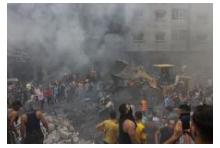Doctors Without Borders is still on the ground in Gaza. Donate now to ensure we are ready to respond to emergencies there and around the world.
by Doctors Without Borders/Médecins Sans Frontières (MSF)Doctors Without Borders/Médecins Sans Frontières (MSF) has worked in Gaza for 35 years, but the escalation of violence in the past two years has been especially catastrophic. On October 7, 2023, Hamas militants launched horrific attacks within Israel, killing more than 1,200 people and taking 251 people as hostages. In response, Israel launched a military offensive on Gaza that has so far killed more than 67,000 Palestinians, wounded over 168,000 people, and left and estimated 44,000 children orphaned. Over 1,720 health care workers have been killed, among them 15 of our MSF colleagues.
The ceasefire in Gaza brings a welcome moment of relief for exhausted, starved, and grieving Palestinians and a great relief to the families of all hostages. However, it comes after more than two years of relentless violence and months of the Israeli forces’ near-total siege. People still desperately need basic necessities in Gaza: Medicine, food, water, fuel, and adequate shelter for 2 million people who will face the approaching winter without roofs over their heads. An immediate sustained and unimpeded flow of humanitarian assistance is desperately needed into and across Gaza.
While MSF welcomes the ceasefire, the end of conflict does not mean the end of people’s horrendous suffering.
To help address people’s needs, MSF is still on the ground. Our teams continue to offer surgical support, wound care, and vaccinations. The more than 1,100 MSF team members working in Gaza right now—98 percent of them locally hired—are providing lifesaving care while also enduring the same harsh conditions as the patients they treat. Across Gaza, we offer surgical support, wound care, and vaccinations; run maternity and neonatal intensive care units; and distribute clean water.
Palestinians in Gaza who survived the war are now living amid the ruins of their homes. They are facing immense medical, psychological, and material needs. The ceasefire must be respected and sustained. It is the only way people can get the care they need, something that was impossible while under Israeli forces’ constant bombardment.
MSF teams remain committed to providing lifesaving care for our patients in Gaza and other emergencies around the world, including rising needs in Sudan, Afghanistan, Ukraine, and over 75 countries around the world.
MSF USA takes no government funding and relies on unrestricted funds from private donors like you. This means that when an emergency strikes, we don't have to write grants or face red tape and restrictions before we respond—we can act fast and start saving lives immediately.
